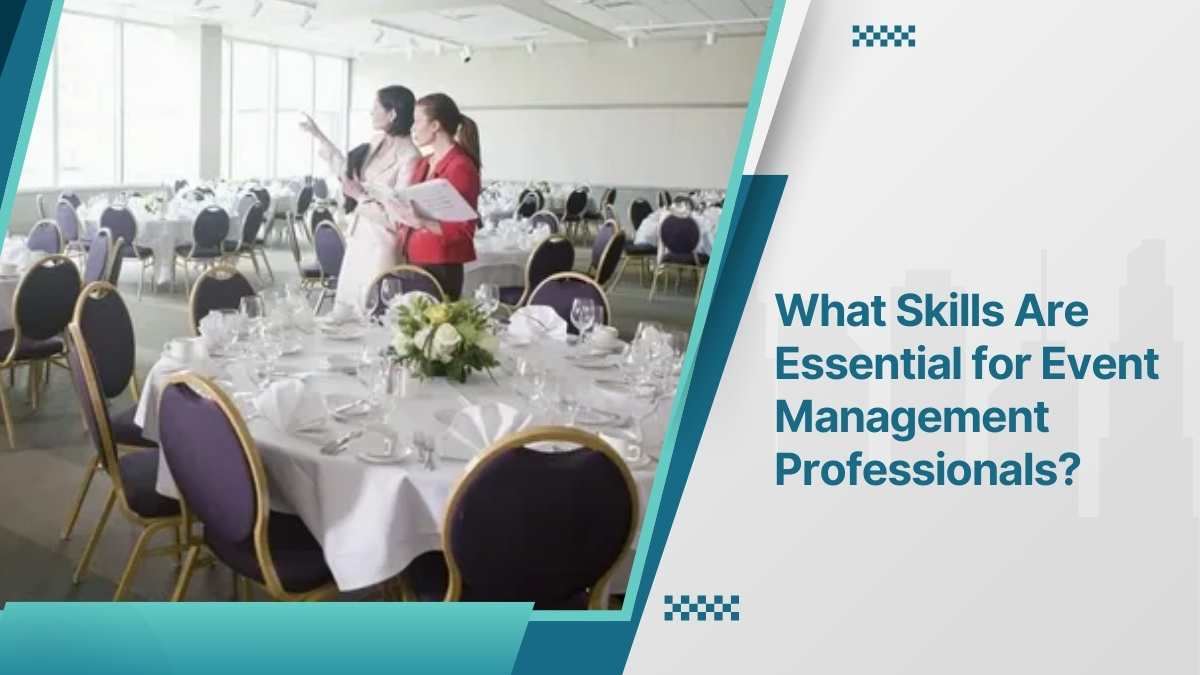Event management is a dynamic and challenging field that requires a variety of skills to ensure that each event runs smoothly. Whether you’re organizing a small corporate gathering, a large wedding, or an international conference, event management professionals must juggle multiple tasks, coordinate with vendors, manage teams, and most importantly, deliver a memorable experience for guests. This blog will explore the essential skills every event management professional should have to succeed in their role.
Why Are Skills Important for Event Management Professionals?
Event management involves much more than just setting up decorations or sending invitations. It’s about creating seamless experiences while managing a range of logistical, financial, and creative tasks. Having the right skills can make the difference between a successful event and a chaotic one. Here are some reasons why skills are so important:
- Efficiency: Strong skills help event managers handle multiple responsibilities at once, ensuring smooth operations.
- Problem Solving: Events rarely go exactly as planned. Professionals need to handle unexpected challenges with ease.
- Client Satisfaction: The ultimate goal is to make sure the client is happy with the event. The right skills help professionals exceed expectations.
- Reputation: Event managers with strong skills gain the trust of clients and often receive recommendations for future work.
Note: If you’re looking to elevate your next event, turning to Event Management Professionals in Dubai can make all the difference. These experts ensure smooth operations, innovative designs, and memorable experiences. Let Mystique Exhibitions guide your event to success. Contact us today for a tailored plan!
Let’s now break down the essential skills every event management professional should possess.
1. Organization and Time Management
The backbone of any successful event is great organization. Without proper planning and time management, events can easily spiral out of control.
1.1 Organizing the Event Workflow
An event management professional must be able to plan every detail in advance and keep track of each task. This includes coordinating timelines, scheduling meetings, tracking deadlines, and ensuring that all tasks are completed on time.
1.2 Time Management
In the world of event management, time is often your biggest enemy. Professionals must juggle numerous tasks simultaneously, from booking venues to managing guest lists. Time management allows them to allocate time for every task and ensure nothing is forgotten.
Why It’s Important: Strong organizational and time management skills help prevent last-minute rushes, errors, and stress. They allow event managers to handle their responsibilities smoothly, ensuring that nothing is overlooked.
2. Communication Skills
Effective communication is the cornerstone of successful event management. Professionals need to communicate with a variety of stakeholders, including clients, vendors, staff, and guests.
2.1 Client Communication
Event managers need to understand client expectations, preferences, and budget requirements. Keeping open lines of communication throughout the planning process is essential for meeting their needs.
2.2 Team Communication
Event managers also need to relay information to team members and vendors. Clear instructions and continuous communication ensure that everyone knows their responsibilities and tasks.
2.3 Crisis Communication
When unexpected challenges arise, professionals must be able to convey information clearly and calmly to all involved parties. This helps prevent panic and confusion during high-pressure situations.
Why It’s Important: Good communication helps ensure that all parties are on the same page, reducing confusion and promoting teamwork. It also helps to build strong relationships with clients and vendors.
3. Attention to Detail
Event management requires a keen eye for detail. From the smallest decorative touch to the accuracy of guest lists, event managers need to ensure everything is in order.
3.1 Spotting Potential Problems
An effective event manager can anticipate potential issues before they arise. This could include looking out for logistical concerns, scheduling conflicts, or issues with vendors. Identifying these potential problems early helps to avoid larger issues later.
3.2 Managing Guest Experience
An event manager must ensure that every detail, from the seating arrangement to the food served, contributes to a positive experience for guests. Small touches like personalized favors or custom lighting can make a big difference.
Why It’s Important: Attention to detail ensures that every aspect of the event is polished and professional. It helps avoid oversights and guarantees that the client’s vision is realized in the event.

4. Problem Solving
Event planning is full of surprises. Issues can arise at any point, whether it’s a last-minute change from a vendor or an unexpected weather problem for an outdoor event. Event managers must be quick thinkers with problem-solving skills.
4.1 Handling Unexpected Situations
Whether it’s a missing vendor or a technical glitch, event managers need to come up with solutions on the spot. Being able to think creatively and remain calm in stressful situations is vital.
4.2 Managing Budget Challenges
Sometimes, unexpected costs or financial constraints can impact the event. Event managers need to quickly adjust the budget and find cost-effective solutions without compromising the quality of the event.
Why It’s Important: Problem-solving skills ensure that event managers can stay calm and focused when things go wrong. This helps to resolve issues efficiently and prevents disruptions that could affect the event.
5. Creativity and Innovation
While event management involves logistics and planning, creativity is equally important. Professionals must come up with creative ideas to make each event unique and memorable.
5.1 Design and Themes
Event managers are often involved in the design and theme of the event. They must work with decorators and designers to ensure that the event looks visually appealing and aligns with the client’s vision.
5.2 Innovative Solutions
Incorporating new technologies, trends, and unique experiences can make an event stand out. Event managers who bring fresh ideas and creative solutions add value to their clients’ events.
Why It’s Important: Creativity helps event managers provide unique experiences that leave lasting impressions. It ensures that each event is different and tailored to the client’s preferences.
6. Negotiation Skills
Event management involves working with a variety of vendors, suppliers, and contractors. Strong negotiation skills are essential to securing favorable terms and pricing for the event.
6.1 Vendor Contracts
Event managers must be able to negotiate with suppliers for the best prices, services, and delivery terms. This involves knowing the value of the services being provided and understanding what’s reasonable within the event budget.
6.2 Securing Discounts
Event managers often deal with bulk bookings for venues, catering, or transportation. Their ability to negotiate discounts can help save money for the client, making it an essential skill in their toolkit.
Why It’s Important: Effective negotiation helps ensure that the event stays within budget while still delivering high-quality services. It also helps foster good relationships with vendors, which can lead to future discounts and deals.
7. Leadership and Team Management
Event management professionals often oversee a team of staff, contractors, and volunteers. Strong leadership skills help ensure that the team works together efficiently to execute the event.
7.1 Delegating Tasks
A good event manager knows how to delegate tasks effectively. They understand the strengths and weaknesses of their team members and assign responsibilities accordingly.
7.2 Motivating the Team
Event management can be demanding, especially on the day of the event. Event managers need to keep the team motivated and on track, ensuring that everyone is working toward a common goal.
Why It’s Important: Strong leadership ensures that the team works together smoothly and efficiently. It helps create a positive work environment, especially during busy and stressful times.
8. Financial Management
Event managers are often responsible for creating and sticking to budgets. They need to ensure that the event stays within financial constraints while still meeting the client’s expectations.
8.1 Setting and Sticking to a Budget
An event manager must work with the client to establish a realistic budget and allocate funds to different aspects of the event, from the venue to the catering to entertainment. They need to manage the budget carefully throughout the planning process.
8.2 Tracking Expenses
Event managers also need to track all expenses and ensure that the event doesn’t exceed the allocated budget. This includes paying vendors, managing deposits, and ensuring that all costs are accounted for.
Why It’s Important: Financial management skills help prevent cost overruns and ensure that the event stays within budget. This is crucial for delivering value to clients without compromising on quality.
Conclusion
Event management professionals require a diverse set of skills to handle the complexities of planning, organizing, and executing successful events. From communication and organization to creativity and problem-solving, these skills are essential for creating memorable and efficient events. By continuously developing these skills, event managers can ensure that they not only meet but exceed their clients’ expectations, paving the way for a successful career in event management.
For More Insightful Articles Related To This Topic, Feel Free To Visit: unbusinessnews.










